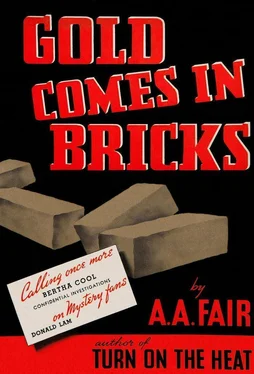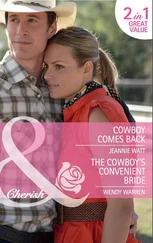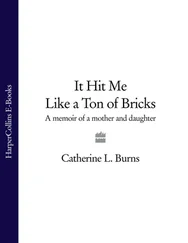“But you’re going up to Valleydale?”
“Yes.”
“You don’t know how long you’ll be gone?”
“No.”
“You’ll be going out to the house to pack up some things and—”
“I won’t be going anywhere to pack up anything. I’m going over to the garage, get the agency car, and get started. I’ll buy what clothes I need.”
“You’re leaving right away?”
“Just one thing I have to attend to.”
“What’s that?”
“Winding up Mr. Fischler’s business transaction.”
“I can drive you up to the Commons Building.”
“Let’s telephone first,” I said. “Wait here. I’ll be back.”
There was a public telephone in the gas station at the parking lot. I called up the number Elsie Brand had given me. She answered the phone. “Hear anything?” I asked.
She said, “You must have thought they didn’t want your money.”
“Why?”
“You said they’d tell you you had until about two o’clock this afternoon.”
“What did they say?”
She said, “The salesman’s been here twice. He’s coming back in ten minutes. He said to tell you that he could put it across, but the time expired at one.”
I said, “Stick around. I’m going to draw up the option agreement.”
“He has one with him.”
“I don’t think I’ll like it.”
“Do you want me to tell him?”
“No. Just stick around. I’m coming right up.”
I walked back to the car and said to Ashbury, “Okay, drive me up to the Commons Building if you will — or I can take a taxi.”
“No. I want to keep my finger on the pulse of things.”
Ashbury waited outside while I went up to the office. Rich was waiting for me when I came in. He pumped my hand up and down, and said, “Congratulations, Mr. Fischler! The shrewdest buying brain I’ve contacted in fifteen years of salesmanship. You win!”
He took my arm and piloted me into the private office as though he owned the joint. He whipped a stock certificate out of his pocket and said, “There you are. One share. Here you are. An option agreement duly signed by the president and secretary of the company.”
“You work fast,” I said.
“I had to, to put a deal like that across. They hit the ceiling, but I explained to them that your money wasn’t available right at the moment, that you were a hundred per cent sold, that you’d make us a good stockholder, that you—”
He kept on talking, but I quit listening. I was reading the option agreement. To my surprise, it was exactly what I had instructed him to have. I signed an okay on the duplicate option agreement, gave him one thousand dollars, and put the share of stock and original option agreement in my pocket. The option was signed by Robert Tindle as president and E. E. Matts, secretary. I shook hands with Rich, told him I had an appointment, and eased him out of the office. I said to Elsie, “Remember, you’re to keep the office open until I get back.”
“Where are you going?”
“I’m out of town on a business trip.”
“You explained to Bertha about the work?”
“Yes.”
“What did she say?”
“It’s all right.”
“Then I’m to sit here and just read magazines?”
“That’s right. Do a little sewing if you want to. Smoke cigarettes during office hours, and chew gum. That’s the sort of business this is, one of those happy-go-lucky affairs.”
She laughed. “I’ll feel like a kept woman.”
“That’s what I want you to look like,” I said. “Get the idea?”
Her eyes flashed me a smile. She said, “Good luck, Donald.”
“Keep your fingers crossed,” I said, and went out to tell Ashbury I was all ready to go. He insisted on driving me over to the garage where Bertha Cool kept the office car. His eyes were wistful as I pulled away into traffic.
Valleydale had at one time been something about which a Chamber of Commerce could wax eloquent. The mountains, covered with digger pine, chaparral, manzanita, and, lower down, with big live oaks, broke into peaceful rolling hills, then into what had once been a fertile agricultural valley.
Now, it was a mass of rocks, piled in serrated ridges where the conveyor belts of the gold dredgers had dumped them. They were rounded rocks that had been worn by ancient glaciers and rivers. They were the bones of what had at one time been huge boulders, and now they glistened in the sunlight like bleached bones in the desert. Here and there an attempt had been made to level off the ground and plant orchards. On the rolling hillsides which the dredgers hadn’t touched, the massive oaks cast dark pools of inviting shadow. The slopes were broken here and there with bits of vineyard and, in places, with the green of orchards. They gave a clue to what the country must have been at one time.
A river, flowing down from the mountains, broke through a cut near the town of Valleydale, spread out into smooth placid waters, and then ran through the ugly piles of rock tailings.
I found an auto court and registered, giving the license of the agency car and the name of Donald Lam. Later on, when it would be necessary to account for every minute of my time to the police, I didn’t want to have it appear that I’d taken an alias, or resorted to flight.
I went right to work.
The people who were left in the town hated gold-dredging with a bitter hatred. The ones who had owned the land originally had made their clean-up, taken the cash, and gone to the bigger cities. The dredgers had pumped prosperity into the town through pay rolls, machine shops, and offices, then they had worked out the ground. The machine shops had been moved. The offices stood deserted. There was an air of funereal despair about the town. Those who were left went dejectedly about their business, moving with the listless lassitude of persons who have lost their chance at winning big stakes and are plugging away simply because they can’t figure out how to quit.
No one knew what had happened to the records of the dredging company. The head office had always been somewhere else. The books were gone, the machinery was gone, and the employees were gone.
I made inquiries to find whether some of the old employees were still in the country. A man who kept a dry-goods store told me he thought an old hermit bachelor named Pete Something-or-Other had worked on the original dredgers and on the drills when the ground was prospected. He didn’t know Pete’s last name, and didn’t know exactly where he lived, but he had a shack about a mile down the river. There was a little strip of land the dredgers hadn’t got. Pete lived on it. He came into town once in a while for supplies. He paid cash and wasn’t sociable. No one seemed to know exactly how he lived.
I learned that a new company was planning to use some sort of a new invention to put the rocks underneath and bring the soil back on top. Old-timers said that even if the soil were put back on top, it would be years before it could grow anything. Others were of the opinion that scientific fertilization would have it producing crops in no time. None of them tried to marshal facts and reach an intelligent, impartial opinion from those facts. They advanced an opinion first, then selected illustrations, gossip, and garbled rumor to support that opinion. Anything which didn’t support it was ignored entirely. I figured there wasn’t much chance of finding out anything from them.
It was getting dark when I found Pete’s shack. It had at one time been the operating house on a gold dredger, with windows all around it. About half of the windows were covered with tin which Pete had flattened out from old five gallon coal-oil cans and nailed over the openings.
Pete was somewhere in the late sixties. He was big-boned and didn’t carry much flesh. There was no sag to him anywhere. His last name was Digger.
Читать дальше












